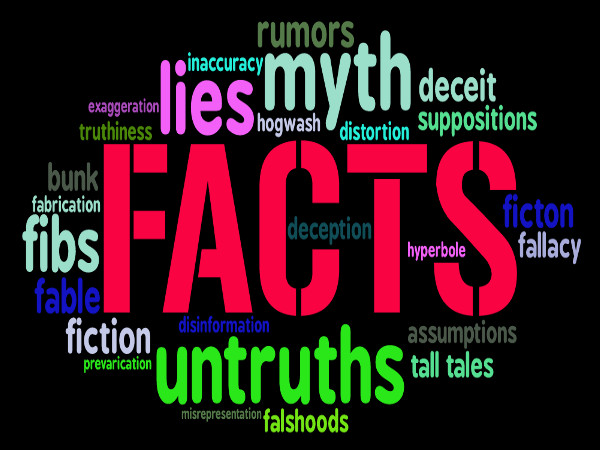Facts? We Don’t Need No Stinking Facts.
 MONTREAL – Deep within a recent article about Pornhub’s new sexual education efforts — a possibly Quixotic effort that is a rich subject for an article all its own — lies an eyebrow-raising claim that says it all when it comes to the deep, fundamental cluelessness writers working for mainstream publications often exhibit when writing about the porn industry.
MONTREAL – Deep within a recent article about Pornhub’s new sexual education efforts — a possibly Quixotic effort that is a rich subject for an article all its own — lies an eyebrow-raising claim that says it all when it comes to the deep, fundamental cluelessness writers working for mainstream publications often exhibit when writing about the porn industry.
“Can a site that grosses billions of dollars per year and develops brand loyalty through eroticized abuse, lies about women’s bodies and desires, and disregard for contraceptives simultaneously teach users about consent and safe sex?” asks Leah Fessler, writing for QZ.com.
This might be an interesting and worthy question, if only Pornhub was a site that “grosses billions of dollars per year.”
Of course, there’s no such thing as a porn site that grosses billions of dollars per year, nor has one ever existed. If you think about it, even for a moment, in an industry where global annual aggregate revenue likely amounts to several billion dollars a year (although nobody can be sure how many billions due to the paucity of reliable data), it’s patently absurd to believe any single site owns a large enough share of the market to be taking in billions all by itself.
Does this sort of ludicrous exaggeration serve a purpose, other than to reinforce the idea the porn industry (as represented by one of its best-known brands) is far larger than it is, an intentional inflation that is, in turn, typically designed to make readers fear and resent the adult industry even more than they already do?
Being charitable, I suppose one could argue Fessler’s false claim is the result of a typo, and she intended to use the word “industry” instead of “site” — but if that’s the case, the rest of the statement becomes, at best, a facile slandering of dozens, possibly hundreds, of companies and individual producers who do not develop “brand loyalty through eroticized abuse.”
Either way, Fessler’s claim is more sensational than factual, an appeal not to the reason of the reader, but to our tendency to be resentful and suspicious of faceless corporate others to which we can append the term “big” as a pejorative, ala “Big Oil” or “Big Pharma” or “Big Content.”
While Fessler doesn’t use the term Big Porn, the implication of the pumped-up statistics offered in the article (including the oft-cited but never documented/sourced, claim that porn is a “$97- billion” industry) are clear: The porn industry is a monolith, of which Pornhub is broadly representative.
Never mind that Pornhub is among the most controversial brands within the porn industry, and never mind that a lot of producers and studios utter the name with barely concealed contempt, still stinging from the profligate content piracy that typified the site’s early years. To many mainstream writers like Fessler, Pornhub is the porn industry — and vice versa.
It may seem strange to fixate on the revenue-related claims in Fessler’s article, in no small part because these assertions are irrelevant to the larger issue she is addressing. Still, the casual way something as obviously false as the idea Pornhub “grosses billions of dollars” is simply floated out there like it’s common knowledge and conventional wisdom troubles me.
I can’t help but see a claim like this in the same vein as Donald Trump’s baseless assertions about millions of illegal voters robbing him of the popular vote, or the annual flurry of stories claiming, again without factual foundation, domestic violence “spikes” on the day of the NFL’s championship game (the proper name of which I dare not publish here, lest the insanely protective NFL pounce on me for using their trademarked term without due permission).
Don’t get me wrong. I’m not suggesting Fessler’s casual restatement of frequently-peddled misinformation about the porn industry rises to the level of a sitting President making wild, unsupported claims concerning widespread voter fraud. I’m just saying it’s lazy, intellectually and professionally, to regurgitate false information in the context of an article that, among other things, complains about the accuracy of the sex-ed information offered by Pornhub.
As it happens, I agree with Fessler when it comes to the gist of her piece: Pornhub offering itself up as a sex education resource is hard to accept as a straightforward public service. Offhand, it feels more like a publicity ploy than a genuine attempt to educate — a feeling reinforced by the company’s long history of promoting itself through public campaigns that seem to have been engineered for maximum controversy.
I just wish Fessler (and many other mainstream writers who cover adult entertainment) could find a way to address the porn industry as she presumably would other business sectors: By not attributing to the entire space characteristics they see in a single entity, be it Pornhub or any other individual adult company.
This is probably too much to ask in the age of fake news, “alternative facts” and other forms of truthiness, I realize. But a man can dream, no?













